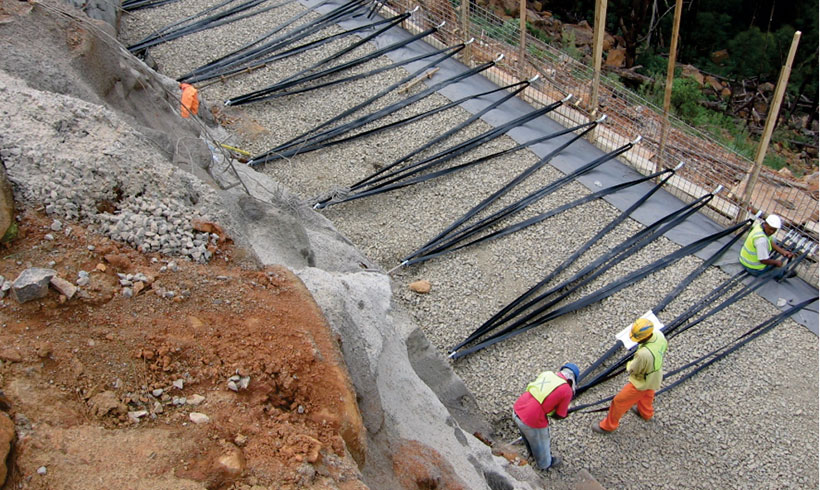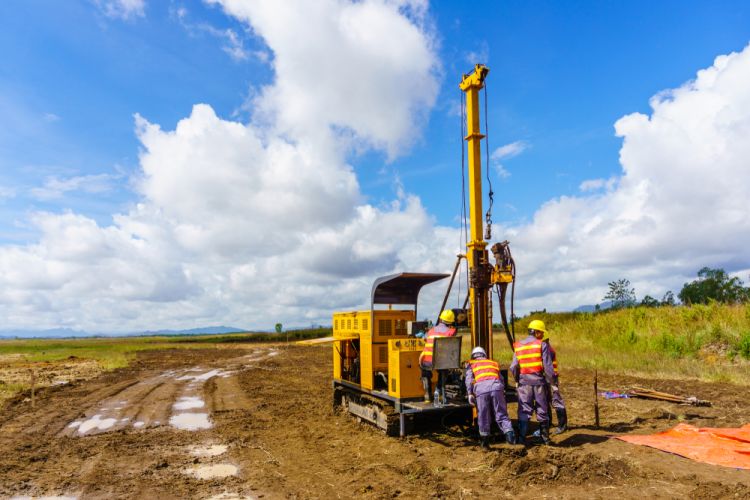Not known Facts About Specialized Geotechnical Engineering Solutions
Not known Facts About Specialized Geotechnical Engineering Solutions
Blog Article
Facts About Specialized Geotechnical Engineering Solutions Uncovered
Table of ContentsRumored Buzz on Specialized Geotechnical Engineering SolutionsThe Best Strategy To Use For Specialized Geotechnical Engineering SolutionsHow Specialized Geotechnical Engineering Solutions can Save You Time, Stress, and Money.9 Easy Facts About Specialized Geotechnical Engineering Solutions Explained
They carry out site investigations, collect examples, execute research laboratory examinations, and evaluate data to evaluate the viability of the ground for building and construction jobs. Based upon their searchings for, geotechnical designers provide recommendations for structure design, incline security, retaining structures, and reduction of geotechnical risks. They work together with other specialists, such as engineers, architectural engineers, and construction groups, to guarantee that geotechnical considerations are integrated right into the total job design and application.
Structure Layout: Geotechnical designers play an essential function in developing structures that can safely support the intended framework. They evaluate the soil problems and tons requirements to figure out the ideal structure kind, such as superficial structures (e.g., footings), deep structures (e.g., stacks), or specialized methods like dirt renovation. They take into consideration factors such as negotiation limitations, birthing ability, and soil-structure communication to establish optimum structure styles.
Indicators on Specialized Geotechnical Engineering Solutions You Need To Know
Here are some sorts of geotechnical engineers: Structure Engineer: Structure designers concentrate on designing and evaluating structures for frameworks - Specialized Geotechnical Engineering Solutions. They analyze the soil problems, tons needs, and site attributes to identify one of the most proper foundation kind and design, such as shallow foundations, deep structures, or specialized methods like heap structures
They execute field screening, accumulate examples, and evaluate the gathered information to characterize the soil residential properties, geologic developments, and groundwater problems at a site. Geotechnical Instrumentation Designer: Geotechnical instrumentation engineers focus on tracking and gauging the actions of soil, rock, and frameworks. They mount and keep instrumentation systems that monitor elements such as soil negotiation, groundwater degrees, incline movements, and structural displacements to assess efficiency and supply early warnings of potential concerns.
In the workplace setting, geotechnical designers use specialized software program tools to perform calculations, create designs, and evaluate data. Specialized Geotechnical Engineering Solutions. They prepare records, review project specs, connect with customers and group members, and coordinate project tasks. The workplace setting offers a conducive setting for research study, evaluation, and collaboration with various other specialists included in the task
They regularly check out task websites to carry out site examinations, examine geotechnical conditions, and gather data for evaluation. These visits involve taking a trip to different locations, sometimes in remote or tough terrains. Geotechnical engineers may carry out soil tasting, conduct tests, and monitor building activities to ensure that the geotechnical facets of the task are being implemented appropriately.
A Biased View of Specialized Geotechnical Engineering Solutions
Geotechnical designers also work in specialized geotechnical laboratories. In these centers, they conduct experiments, perform tests on dirt and rock examples, and examine the design homes of the materials. Geotechnical lab designers function thoroughly in these settings, dealing with testing devices, running tools, and recording data. They work together with other research laboratory staff to ensure precise and trusted screening outcomes.
Keeping Walls: Creating wall surfaces that keep back dirt to stop landslides and give security on sloped surfaces. Embankments and Earthworks: Designing embankments for roads, railways, and look at more info dams to ensure they continue to be secure under stress and anxiety. The mining market depends heavily on geotechnical engineering to ensure the safety and security and durability of its operations.
With this in mind, we have designed our program to prepare trainees for success. The Geotechnical Design program at the University of Delaware offers opportunities for innovative research study and study in: Dirt and rock technicians Soil-structure communication Integral modeling Computational geomechanics Foundation and planet frameworks engineering Ground improvement Incline security and landslide stablizing his comment is here Liquefaction of soils and quake engineering Lab characterization of geomaterials and soil reinforcement Ecological geotechnics Provided the solid requirement for improvement to our country's infrastructurethe American Culture of Civil Designers offered the united state
Geotechnical design is a branch of civil design; nonetheless, it includes making use of clinical techniques and principles to gather and interpret the physical properties of the ground. Geotechnical designers are entailed in all phases of the layout of structures, from concept to building. Their job is vital in the design and planning procedure as they examine the integrity of soil, clay, silt, sand, and rock, before construction commencing.
Examine This Report about Specialized Geotechnical Engineering Solutions
This is complied with by a ground investigation based upon the findings of the desk study and entails trial pitting and tasting to reveal any potential issues. Geotechnical designers function within multidisciplinary groups, supported by intermediate and junior designers along with by CAD technicians. As a senior geotechnical designer on a hydro plant task, jobs might consist of taking part in technical evaluations (e.g., peer testimonials), tailings clog examinations, dam safety and security evaluations, and other studies connected to the style and building of mine waste facilities.
While some specialists are check here experts exclusively in geotechnics, others may function under titles like engineering rock hound or ground designer within similar capacities. As a geotechnical designer, you'll need to: build and keep connections with clients and various other experts included in the website, throughout each projectmaintain safety and security standards on website bear in mind price effects when you make recommendationsstudy geological maps and aerial photos from a variety of resources and from different time periodsexamine construction plans to see how possible they are based on your understanding of the siteinvestigate dangers or geological threats for the sitesearch for ecologically sensitive functions, such as landfill begin to establish valid and interpretive ground modelsplan area investigationsdrill and evaluate samples of bedrock, dirt, groundwater and added materials monitor other specialists on sitesolve technical concerns as they arise, such as unanticipated structures at drill sitesmonitor conditions during and after building and construction to make sure structures are steady in the short and long termadd information collected on website to your first researchcreate geotechnical calculations, drawings, and two or three-dimensional computer system models translating the datamake recommendations concerning the proposed use the website.
There are great deals of opportunities to fulfill new individuals, as you'll collaborate with a variety of experts at every site. The job can be stressful as you may be liable for the security of others while on website. There is additionally a high level of economic duty, as the suggestions you make can have major price effects.

Report this page